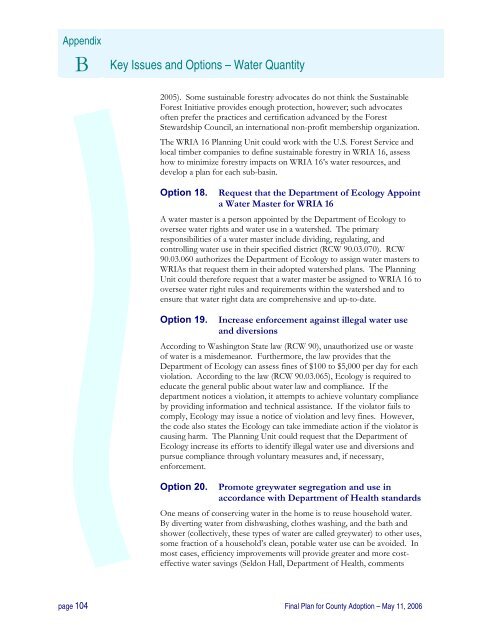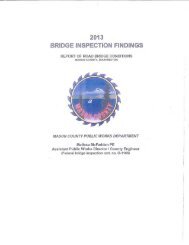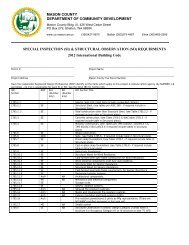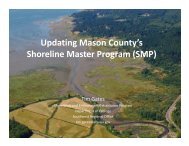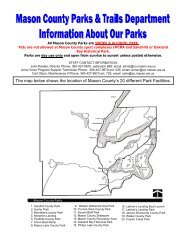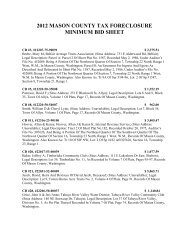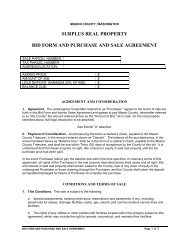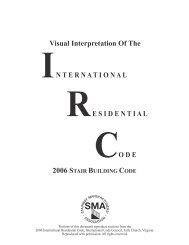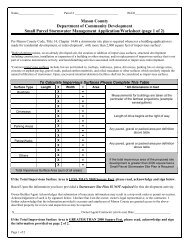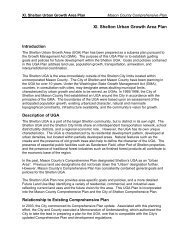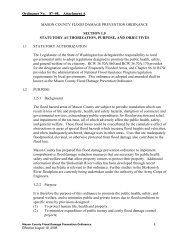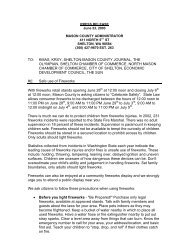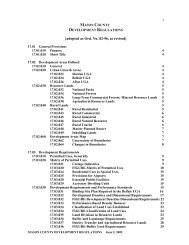Watershed Management Plan - Mason County
Watershed Management Plan - Mason County
Watershed Management Plan - Mason County
You also want an ePaper? Increase the reach of your titles
YUMPU automatically turns print PDFs into web optimized ePapers that Google loves.
Appendix<br />
B Key Issues and Options – Water Quantity<br />
2005). Some sustainable forestry advocates do not think the Sustainable<br />
Forest Initiative provides enough protection, however; such advocates<br />
often prefer the practices and certification advanced by the Forest<br />
Stewardship Council, an international non-profit membership organization.<br />
The WRIA 16 <strong>Plan</strong>ning Unit could work with the U.S. Forest Service and<br />
local timber companies to define sustainable forestry in WRIA 16, assess<br />
how to minimize forestry impacts on WRIA 16’s water resources, and<br />
develop a plan for each sub-basin.<br />
Option 18.<br />
Request that the Department of Ecology Appoint<br />
a Water Master for WRIA 16<br />
A water master is a person appointed by the Department of Ecology to<br />
oversee water rights and water use in a watershed. The primary<br />
responsibilities of a water master include dividing, regulating, and<br />
controlling water use in their specified district (RCW 90.03.070). RCW<br />
90.03.060 authorizes the Department of Ecology to assign water masters to<br />
WRIAs that request them in their adopted watershed plans. The <strong>Plan</strong>ning<br />
Unit could therefore request that a water master be assigned to WRIA 16 to<br />
oversee water right rules and requirements within the watershed and to<br />
ensure that water right data are comprehensive and up-to-date.<br />
Option 19.<br />
Increase enforcement against illegal water use<br />
and diversions<br />
According to Washington State law (RCW 90), unauthorized use or waste<br />
of water is a misdemeanor. Furthermore, the law provides that the<br />
Department of Ecology can assess fines of $100 to $5,000 per day for each<br />
violation. According to the law (RCW 90.03.065), Ecology is required to<br />
educate the general public about water law and compliance. If the<br />
department notices a violation, it attempts to achieve voluntary compliance<br />
by providing information and technical assistance. If the violator fails to<br />
comply, Ecology may issue a notice of violation and levy fines. However,<br />
the code also states the Ecology can take immediate action if the violator is<br />
causing harm. The <strong>Plan</strong>ning Unit could request that the Department of<br />
Ecology increase its efforts to identify illegal water use and diversions and<br />
pursue compliance through voluntary measures and, if necessary,<br />
enforcement.<br />
Option 20.<br />
Promote greywater segregation and use in<br />
accordance with Department of Health standards<br />
One means of conserving water in the home is to reuse household water.<br />
By diverting water from dishwashing, clothes washing, and the bath and<br />
shower (collectively, these types of water are called greywater) to other uses,<br />
some fraction of a household’s clean, potable water use can be avoided. In<br />
most cases, efficiency improvements will provide greater and more costeffective<br />
water savings (Seldon Hall, Department of Health, comments<br />
page 104 Final <strong>Plan</strong> for <strong>County</strong> Adoption – May 11, 2006


